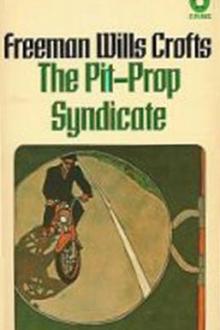The Pit Prop Syndicate by Freeman Wills Crofts (best book club books for discussion TXT) 📕

- Author: Freeman Wills Crofts
- Performer: -
Book online «The Pit Prop Syndicate by Freeman Wills Crofts (best book club books for discussion TXT) 📕». Author Freeman Wills Crofts
He looked at her curiously. The smile had gone from her lips, and her face was pale. She was frowning, and in her eyes there showed unmistakable fear. She was not looking at him, and his gaze followed the direction of hers.
The driver had come out of the shed, the same dark, aquiline-featured man as had passed him on the bridge. He had stopped and was staring at Merriman with an intense regard in which doubt and suspicion rapidly changed to hostility. For a moment neither man moved, and then once again the girl's voice broke in.
"Oh, there is father," she cried, with barely disguised relief in her tones. "Come, won't you, and speak to him."
The interruption broke the spell. The driver averted his eyes and stooped over his engine; Merriman turned towards the girl, and the little incident was over.
It was evident to Merriman that he had in some way put his foot in it, how he could not imagine, un





Comments (0)